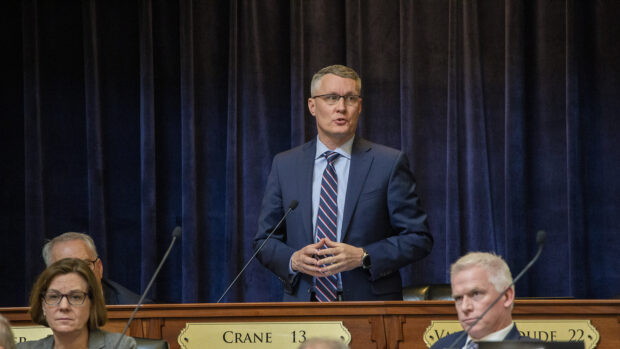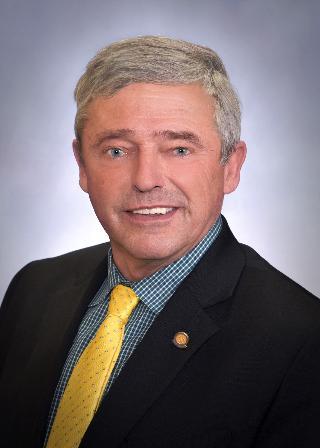The sweet smell of milkshakes hung in the air in House chambers Wednesday afternoon, when Rep. Brent Crane brought in cartons of post-lunch treats for colleagues and staff.
Buying a round of milkshakes, and celebrating a hometown school basketball championship, is one of those camaraderie-building traditions in the House.
Election-year politics also filled the air. Not exactly sweetened up by dessert, House members revisited a salty debate over the latest edition of a library obscenity bill.

At one point, Crane decided the time for soft serve had come and gone. “Why are we fighting so hard to put obscene material in front of our children?” said Crane, R-Nampa, chiding bill opponents. One of those opponents, Rep. Lori McCann, R-Lewiston, rose to object, saying Crane was questioning her motives. Crane, McCann and a group of other House members then took their differences behind closed doors for a sidebar that was, most likely, not an ice cream social.
March, the climax of basketball season, also marks the start of primary season. And this week was thick with debates, and votes, that could shape some contested elections across the state.
Private school tax credits. Guns in schools. Obscene library materials. All within the span of 48 hours.
For the private school parents who crowded a House committee room — joined by a procession of out-of-state and in-state school choice advocates and lobbyists — Tuesday morning’s House committee hearing was their best chance this session to make their case.
The hearing was emotional, punctuated by applause and outbursts from bill supporters, but the outcome felt a bit preordained. There was probably a good reason why the House Revenue and Taxation Committee waited weeks to take up the $50 million tax credit bill: The votes weren’t there, and perhaps never were.
But the vote doesn’t end the debate — especially for the eight committee members who helped kill the tax credit bill. Five of the eight already have GOP primary opponents, with the candidate filing period closing Friday afternoon.
School choice could be a big issue for Rev and Tax Republicans facing challenges from the right — such as Reps. Richard Cheatum of Pocatello, Stephanie Mickelsen of Idaho Falls and Kenny Wroten of Nampa. School choice could also be the defining issue in GOP primaries for House Education Committee members who opposed school choice measures in 2023, a list that includes House Education Chairwoman Julie Yamamoto of Caldwell and McCann, House Education’s vice chair.
At least in theory, the school choice issue could break either way at the polls. Several ardent school choice defenders on the Senate Education Committee — such as Sens. Scott Herndon of Sagle, Tammy Nichols of Middleton and Brian Lenney of Nampa — face well-funded GOP primary opposition of their own.
But in reality, school choice opponents could be more vulnerable in a GOP primary. Consider this year’s edition of the Boise State University Public Policy Survey. Overall, the survey found Idahoans split on school choice, with 49% of respondents voicing support. Among respondents who described themselves as Republicans, that support climbed to 59%.
If Tuesday morning’s committee vote on tax credits was a political flashpoint, the same could be said for Wednesday morning’s Senate State Affairs vote on a guns-in-schools bill: a compromise that collided with political reality.

The bill’s lead sponsor, Sen. Jim Guthrie, received praise for taking on an exercise in policy calisthenics. Guthrie, R-McCammon, proposed requiring districts to write policies allowing staff to carry guns in schools, with required training. He managed to win over school resource officers, who opposed a House version of the bill, and he got the Idaho School Boards Association to neutral.
But Guthrie lost Second Amendment groups — including the National Rifle Association, which backed the House bill. Then Guthrie lost in committee. Not surprisingly, two months before a GOP primary, senators opposed a bill opposed by Second Amendment advocates.
Then came Wednesday afternoon and — again — a libraries vote.
Three sessions into this Statehouse stalemate, the basics of the debate haven’t much changed. Supporters of the latest library bill, and previous editions, maintain that there is a systemic problem: Children can readily access harmful materials at public or school libraries, and the state needs to establish safeguards. Opponents say there is no real problem, or at most, a problem that can be addressed locally.
On Wednesday, the two lawmakers from Nampa’s legislative District 13 squared off on the floor, and it got testy.

In a long and sometimes rambling debate, Wroten said he had called the Nampa library, and was told they had received only two challenges about harmful materials in 2023. In one instance, librarians moved a teen animated book to an adult section. “This has been floating around here for a number of years now,” Wroten said of the repeat library bills. “This feels like legislation in search of a problem.”
Crane said Wroten’s testimony doesn’t square with video evidence from a District 13 constituent, whose 15-year-old daughter checked out harmful materials from the Nampa library. “I do know it is happening in Nampa, Idaho.”
Then, for the third consecutive session, the House passed a library bill. The only difference: This 47-23 vote was a post-milkshake chaser.
It’s another vote that could come up in a primary, for the dozen Republicans who opposed the bill. But it might not be a make-or-break issue. In all, 69% of Boise State survey respondents said they trusted their local librarians. Among Republicans, that support fell, but not drastically, holding at a solid 62%.
This week, legislative leaders hoped to bring the 2024 session closer to adjournment, while incumbents and challengers filed their paperwork to run for one of Idaho’s 105 legislative seats. The legislative calendar and the political calendar were fully in overlap, as if they weren’t already.
Kevin Richert writes a weekly analysis on education policy and education politics. Look for his stories each Thursday.
